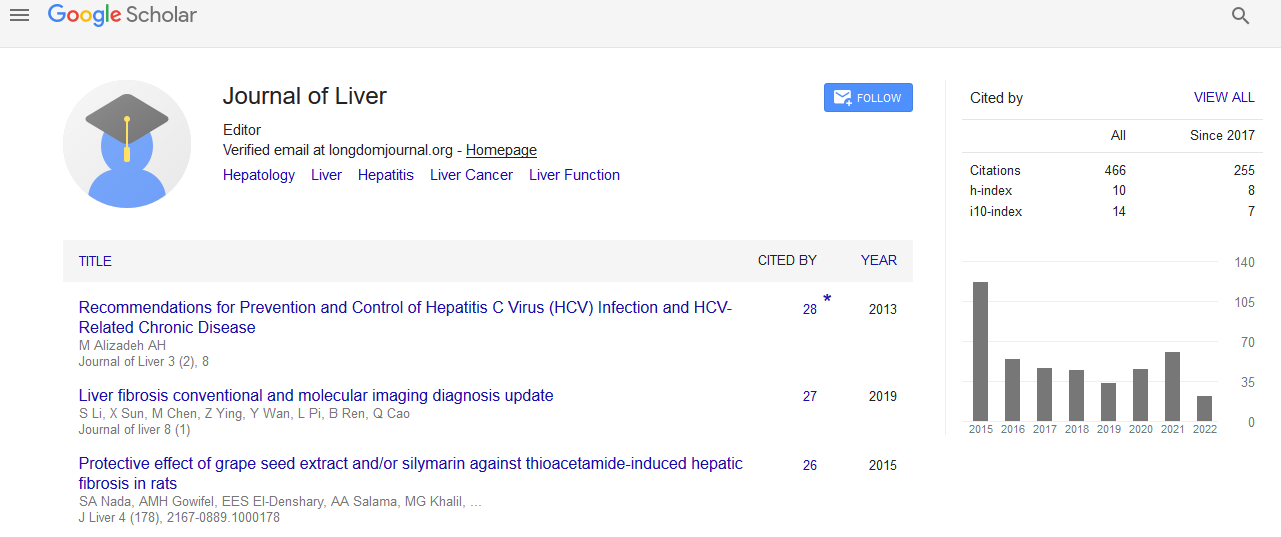PMC/PubMed Indexed Articles
Indexed In
- Open J Gate
- Genamics JournalSeek
- Academic Keys
- RefSeek
- Hamdard University
- EBSCO A-Z
- OCLC- WorldCat
- Publons
- Geneva Foundation for Medical Education and Research
- Google Scholar
Useful Links
Share This Page
Journal Flyer

Open Access Journals
- Agri and Aquaculture
- Biochemistry
- Bioinformatics & Systems Biology
- Business & Management
- Chemistry
- Clinical Sciences
- Engineering
- Food & Nutrition
- General Science
- Genetics & Molecular Biology
- Immunology & Microbiology
- Medical Sciences
- Neuroscience & Psychology
- Nursing & Health Care
- Pharmaceutical Sciences
Abstract
Alpha-1-Antitrypsin Deficiency Presenting as Neonatal Cholestasis: Predictors of Outcome and Effect of Ursodeoxycholic Acid
Ermelinda Santos Silva, Helena Moreira Silva, Cláudia Melo, Herculano Rocha, Margarida Medina and Esmeralda Martins
Background and objective: Alpha-1-antitrypsin deficiency presenting as neonatal cholestasis occurs in a small percentage of affected individuals. The prognosis is variable, from “healing” to liver cirrhosis and/or severe hepatocellular failure, requiring liver transplantation. We researched for predictors of outcome, including the effect of ursodeoxycholic acid. Methods: Retrospective cohort study of 27 cases of neonatal cholestasis due to alpha-1-antitrypsin deficiency, in the period between 1985 and 2013. Inclusion criteria: patients with neonatal cholestasis and ZZ phenotype. Exclusion criteria: presence of other diagnosis or known risk factors for developing neonatal cholestasis. We analyzed several clinical, biochemical, histological and therapeutic variables. Patients were categorized into two groups: favorable outcome (n=18), unfavorable outcome (n=9). We also divided the patients as treated (n=16), and untreated (n=11) with ursodeoxycholic acid. Results: Splenomegaly at admission (P=0.006) and persistent jaundice at 6 months old (P=0.007) were associated with unfavorable outcome. The values of conjugated bilirubin (P=1.000), aspartate aminotransferase (P=1.000), alanine aminotransferase (P=0.371) and gamma-glutamyltransferase (P=0.667) were not significantly different in both groups of outcome. Early treatm e nt with ursodeoxycholic acid was associated with a favorable outcome (P=0.011). Treated patients did not differ significantly from the untreated-ones in biochemical parameters (conjugated bilirubin, aspartate aminotransferase, alanine aminotransferase and gamma-glutamyltransferase), and had significantly lower alpha-1-antitrypsin serum levels (P=0.015). Conclusion: Splenomegaly at admission and persistence of jaundice at 6 months old were predictive for bad prognosis, and early treatment with ursodeoxycholic acid might have interfered positively in the outcome.

